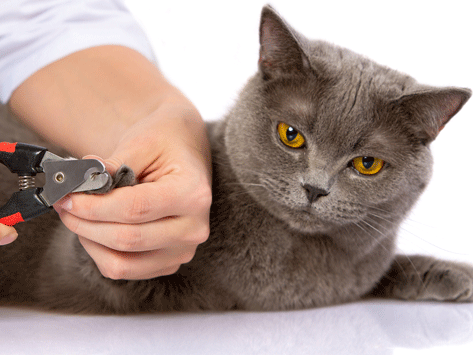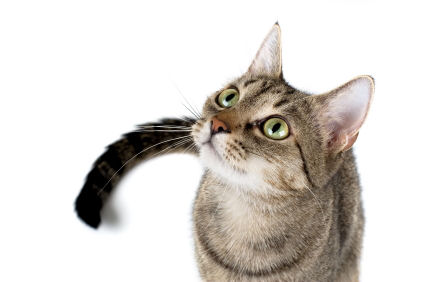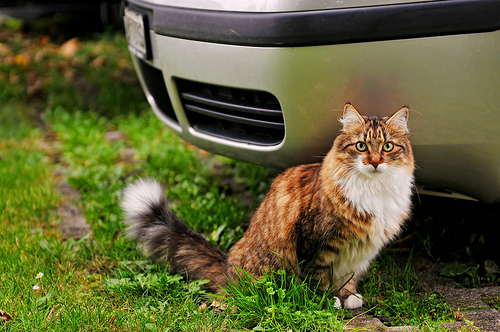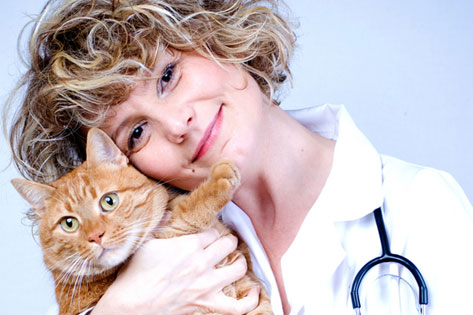Feline illness symptoms often overlap, just as in humans, and it's often hard to really know your cat's level of wellness. The various cat health problems your cat may face are many and varied, and some can have subtle signs. Since your cat can't tell you how she's feeling, you'll have to be observant.
As a rule, your cat is at higher risk for developing a disease if she has been stressed recently. Pre-existing health problems, recent surgery, or a life change of some type can all add stress to your cat's life. Life changing events may include the addition or removal of a family member or other pet, or perhaps a change of homes.
Be aware that your cat can catch a cold or a flu, just as you can. She can also be hit with parasites, certain cancers, and diabetes or heart disease. In addition, there are any number of feline specific conditions. Some of these cat health issues will require treatment.
If you suspect that your cat is not well, it's best to call your veterinarian as soon as possible for a phone consultation. If things seem to get worse, then both you and your vet will be better prepared to handle the situation later. Below are some issues to be alert for.
General indications -- General cat health issues are sometimes similar to what you might experience if you had the flu, a cold, an injury, or an infection. You may see your cat coughing or sneezing. In addition, nasal discharge, lethargy, a fever, or sometimes excessive drooling may be present.
If at any time you notice that your cat faints or falls down, has difficulty walking, jumping, or breathing, contact your veterinarian immediately. You should also be concerned by rapid weight loss or gain, or a bloated appearance or tightness in the abdomen. Other signs of serious feline illness are excessive vomiting or blood in the vomit, signs of pain, or signs of worms.
Behavioral changes -- A dramatic change in behavior or routine in your cat may be a sign of illness. Excessive scratching or licking behavior, a change in sleeping habits, or unusual aggressive tendencies may be signs that something is wrong. If your cat is normally social, but decides to hide in a room all day, that is probably a sign that something is wrong.
Appetite and thirst -- A classic indicator of a cat health problem is refusual to eat, so loss of appetite is certainly suspect. Also on this list would be difficulty in chewing or eating. Failure to drink can lead to dehrydation, which can be life threatening. Refusal to drink while leaning over the drinking bowl is a definite sign of trouble. Increased thirst is also a sign of a number of diseases, including diabetes.
In order to stay alert to cat health problems, you'll want to be alert to your cat's usual behavior patterns. Cats are very good at hiding some of these warning signs. Pay attention to your cat's habits including sleeping, drinking, eating, litter box usage, and levels of activity. If you see a change, keep a closer eye on your cat to see if there's a problem.
Groom your cat at least once a week, preferably more. This is an excellent time to examine your cat for these warning signs. Your cat's attention will be occupied by the grooming, and you can examine her while she's distracted. Checking your cat regularly will help you keep on top of any cat health problems that may arise.

 Trimming Cat Claws: A How-To Guide
If scratch marks on your fu
Trimming Cat Claws: A How-To Guide
If scratch marks on your fu
 Cat Care Tips
Cat Care Tips Cats are a popular pet for many reasons. But
Cat Care Tips
Cat Care Tips Cats are a popular pet for many reasons. But
 Pet Food Ingredients: How to Strike the Right Balance for Your Pet
By Vanessa Voltolina
You&r
Pet Food Ingredients: How to Strike the Right Balance for Your Pet
By Vanessa Voltolina
You&r
 Crate Traveling for Cats
By Victoria Heuer
Cats!! These litt
Crate Traveling for Cats
By Victoria Heuer
Cats!! These litt
 The Healthy Ways Vets Take Care of Their Pets
By Jessica Remitz
Just like every other pet owner
The Healthy Ways Vets Take Care of Their Pets
By Jessica Remitz
Just like every other pet owner